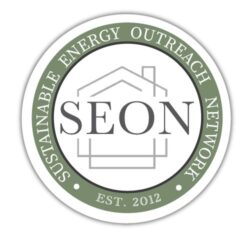On Friday, August 9th, SEON submitted the following proposal to the Brattleboro Development Credit Corporation to be included as a project for Windham County’s Comprehensive Economic Development Strategy (CEDS). An independent team will review all proposals, and announcements will be made around mid-September as to which proposals received top rankings. All proposals will be included in Windham’s CEDS report. No money is connected with this designation, but funding from federal and state agencies will often be linked with those requests that align with local economic development plans.
An Integrated Workforce Development System for the Sustainable Building and Design Economic Sector
The Need:
While Sustainable Building and Design and the Manufacturing of Products in support of Construction is recognized as potentially a vital economic cluster for Windham County, the workforce development system that supports this sector is inadequate to meet the high expectations of the business community. There are multiple assets to support this emerging cluster including access to timber products, kiln drying capacity, productive timberlands, varied weather patterns, State of Vermont Energy Goals, and the accrued knowledge of building science practitioners and researchers. Yet there is limited coordination among the different secondary and higher education institutions to train entry-level workers in current construction practices involving Building Science, as well as advanced learning programs for those mid-level practitioners, energy auditors and designers. When institutions operate independent of one another, the transfer of credit and student awareness and participation in the classes of other schools are minimized. Also, tradespeople in one part of the state may be unaware of offerings in another region. The goal would be to open access to all members of the workforce and not limit learning.
The coordination that does exist is dependent on personalities and relationships and not a system of development deployed throughout the tri-state region. Ongoing programs for collaboration, professional development and a Bachelor’s Degree in Architecture are currently in place, but a workforce development system to support businesses specializing in high performance buildings is not generating the talent to support this business sector. Nor are we attracting a workforce from outside the region to come here because of the sustainable building assets we have to offer. Finally, businesses in this region do not have access to business development services involving marketing, finance, and organizational development to assist them with more efficient business practices.
Contractors in this region are small, independent, and tend to be isolated from one another. Consequently it is very difficult for them to step away from the pressures of cash flow, marketing, and everyday work to connect with region and industry wide developments, participate in ongoing professional development, or find the financial resources and encourage the acquisition of advanced building science skills and knowledge of their employees through continuing education.
Vermont’s Energy Code, 2012 IECC Code, and the expectations of the public are pushing energy advisors, contractors, architects, and tradespersons to design and build according to current best practices for high performance buildings and building science principles. For many of our region’s contractors, it is one thing to be aware of building science concepts and the VT Energy Code, but another matter when it comes to actually applying physics and State Statute to a 50+ year old retrofit challenge. So the questions become, “Who do contractors and other building practitioners in the Windham Region turn to for answers and where is the funding to support the transformation of the Sustainable Building and Design Industry?”
Project Description:
SEON plans to create a consortium of educational providers specializing in Sustainable Building and Design and business consultants within the tri-state region. While all educational providers retain ultimate decision-making authority for their offerings and policies, the goals of the consortium are to facilitate the collaboration amongst the providers for curriculum/certificate coordination (including articulation agreements and transfer of credits), to share information between the practitioners and educators, and to market various offerings that will enhance continuous learning in the economic sector of Sustainable Building and Design. Specifically, the purpose of the consortium will be to:
- Ensure current educational programs meet the needs of the high-performance building industry (including manufacturing) and the employment needs within Windham County. This includes credit-bearing courses, certificate programs, advanced non-credit workshops for continuous professional development inclusive of Energy Code, and the Building Trades curriculum at the secondary technical centers. There needs to be a broad-based emphasis on emerging field Building Science. Potential collaborating institutions will include the Windham Regional Career Center in Brattleboro, River Valley Technical Center in Springfield, Vermont Tech, Community College of Vermont, Keene State College, Greenfield Community College, Southern Vermont Homebuilders and Remodelers Association, Building Performance Professionals of Vermont, New England Sustainable Energy Association, and BuildingGreen, Inc.
- Offer workshops for related business sectors (i.e. lenders, real estate brokers, appraisers, etc) to learn of code compliance, and the evaluation of high performance buildings.
- Market program offerings to encourage certificate-level training that achieves employer expectations.
- Ensure that educational offerings among institutions are routinely offered and clearly represent a viable career path for prospective individuals.
- Assist in obtaining or provide funding for educational initiatives.
- Encourage transferability of credits among different higher educational institutions as well as articulation and dual credit agreements between the secondary technical centers and higher education.
- Assess the need for non-traditional approaches to on-the-job training (i.e., Registered Apprenticeship programs, on-line learning , and other learning systems) while at the same time upholding the expectations of building science educators and practitioners.
- Brand this region as a Center of Excellence for Sustainable Building and Design.
- Promote internships, cooperative education, and summer employment for full-time students.
- Provide business consulting services for local businesses in marketing, planning, finance, and employment practices.
- Ensure that the networking, collaboration, professional-development meetings, and relationship- building practices for those in the industry continue and expand.
- Create a one-stop center that supports the collaborative efforts of the consortium.
Project Outcomes
This project envisions a wide range of wrap-around services for individuals and businesses in the Sustainable Design and Building economic sector:
- Growth of this industry sector in terms of employment, wages, and business prosperity. Potentially a growth of 50-75 employees. Well trained candidates with knowledge and practical experience in advanced building science issues could earn $20 – $30/hr working as a junior project manager. An experienced manager could earn over $30/hr. Construction workers might see a $1.00 increase for building science experience with supervisors earning $5.00 more. One contractor stated he would pay a premium or a sub-contractor with building science experience.
- Relocation or start-ups in Windham County of R & D, manufacturing, and other related sustainable building and design businesses.
- Transformation of Sustainable Building and Design Industry in the Windham Region to one where design and construction professionals, educated and certified in building science, routinely design and build quality, high performance homes (including net zero energy homes.)
- Increase in Energy Code Compliance
- Lenders, real estate agents, lawyers, and appraisers encouraging compliance to Energy Code and promoting the financial value of high performance homes
- Enhanced business acumen of local enterprises leading to business sustainability
- Retention and attraction of a young workforce
Maximize Efficiency and Minimize Call Backs – Even When Business is Booming
Photo Credit: Peter Aschoff

